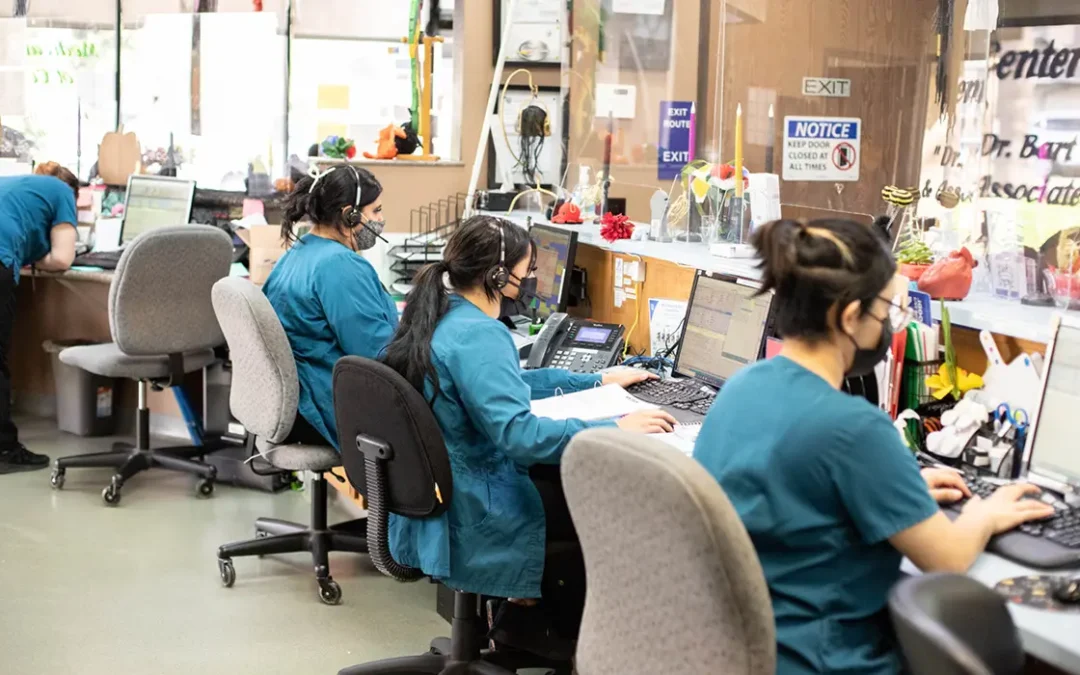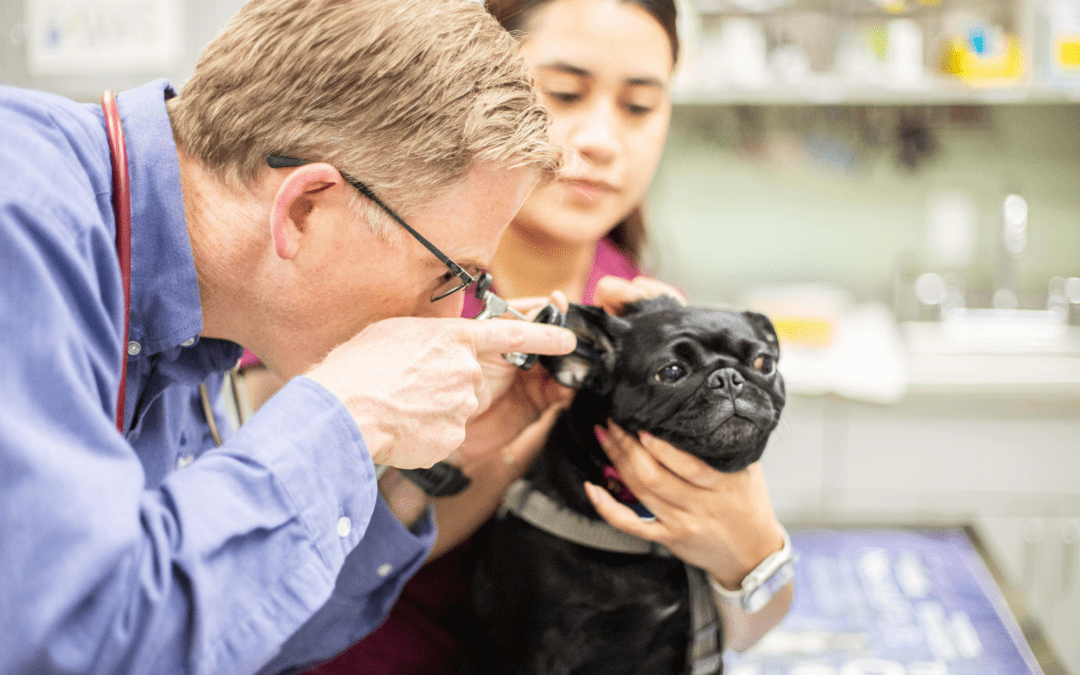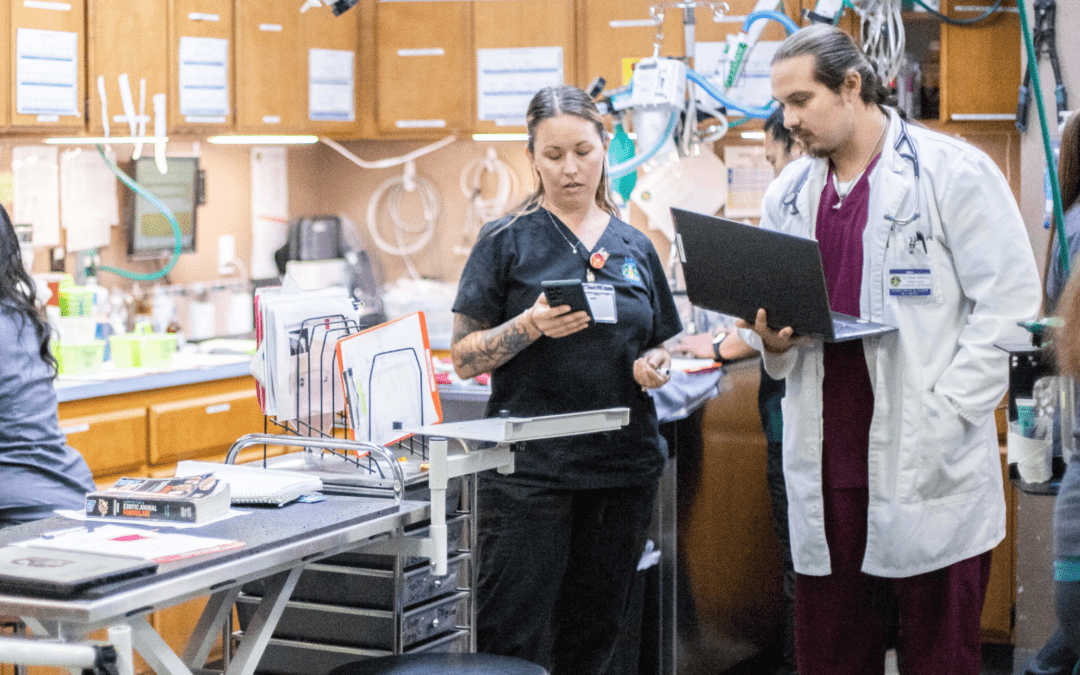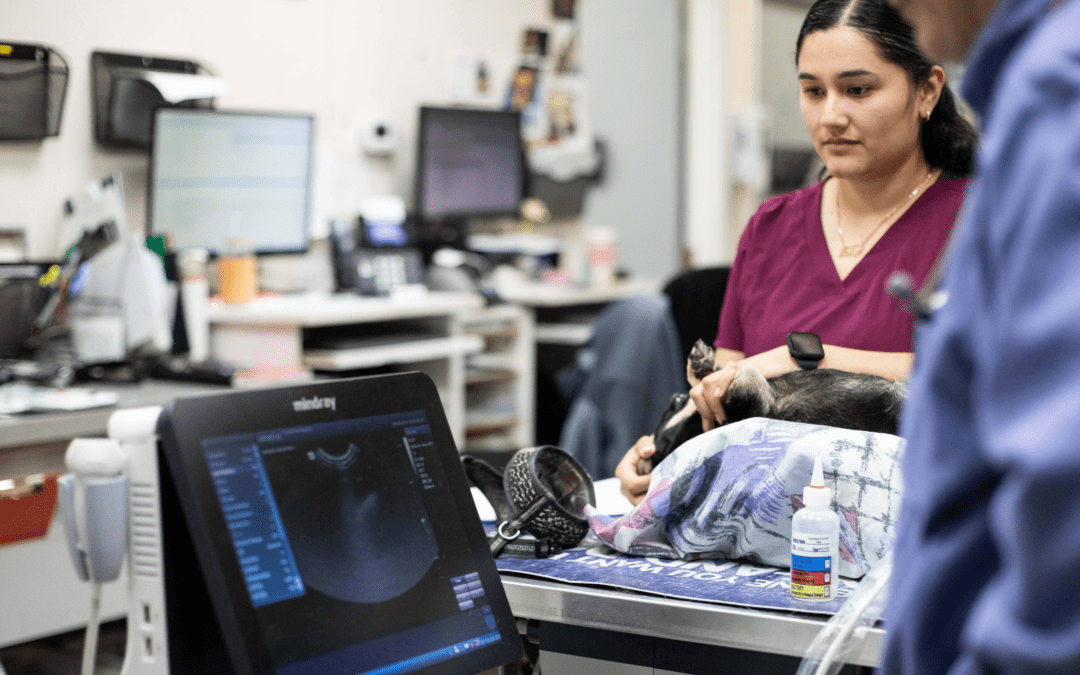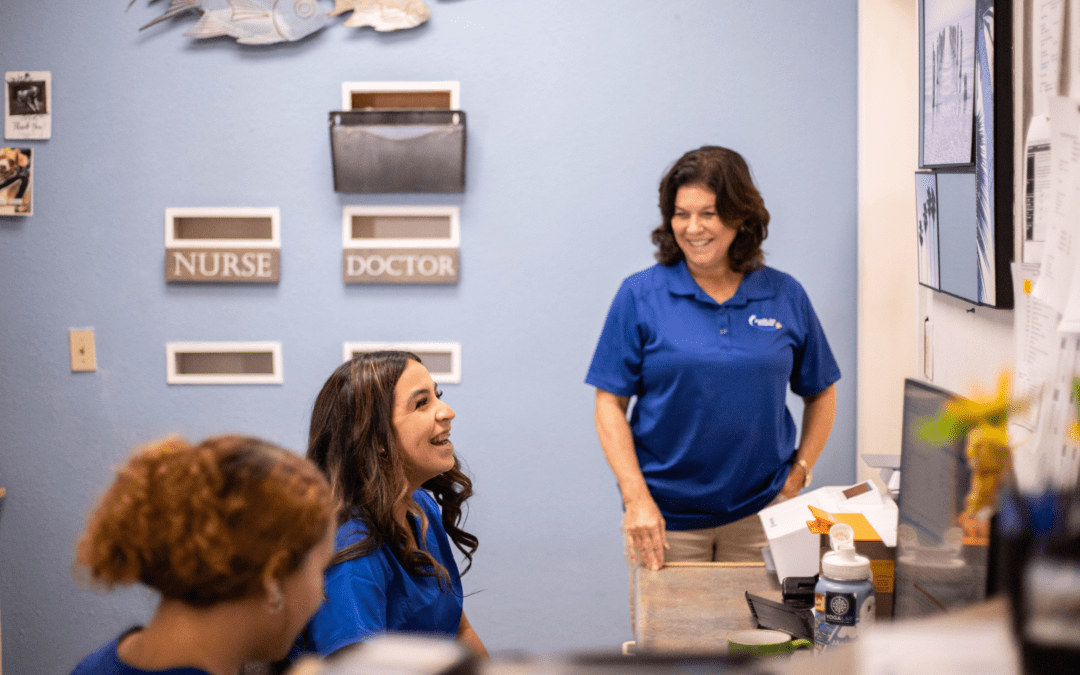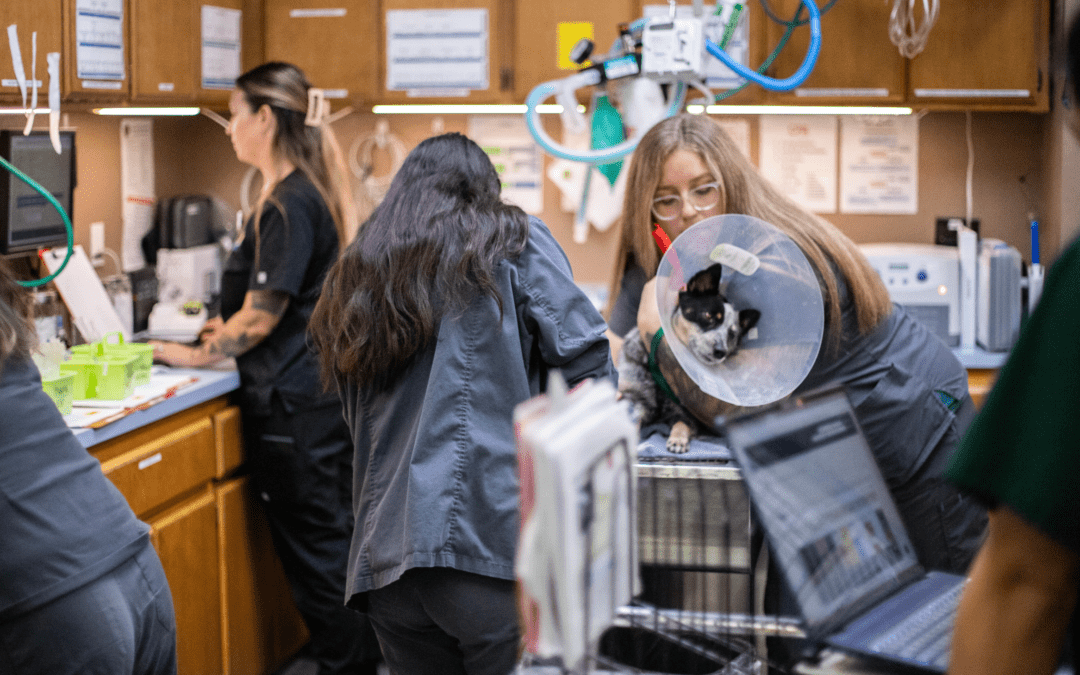As a veterinary customer service representative (CSR), you’re the first person a concerned pet owner sees when they rush their sick or injured pet to your veterinary practice. That means you’re on the frontlines—it’s your job to assess the severity of the patient’s condition and provide care as quickly and efficiently as possible, all while doing your best to ease the client’s nerves. But if a veterinary team doesn’t have the right expertise to effectively triage the patient, it can increase tensions and delay urgent care. That’s why we’re covering all things CSR, defining key concepts and exploring best practices to show how you can become the reliable and trustworthy professional pet parents can count on when they arrive at your clinic.
Urgent vs. Emergency in the Veterinary World
Urgent situations and emergencies differ from one another, but clients who are worried and uncertain of their pet’s health status will feel as if they mean the same thing. That’s why it’s important to reassure pet owners that you and your team will do your very best to provide excellent care in these types of critical situations.
Differences aside, an urgent situation can quickly turn into an emergency if the patient isn’t assessed and cared for right away. Regardless of an emergency, any pet who requires urgent medical attention should be seen and stabilized by your team as fast as possible.
Understanding Veterinary Triage
Urgent and emergency veterinary visits happen every day, making it all the more important for your entire veterinary team to be trained on how to handle these sudden occurrences. From the CSRs to the DVMs, effective triage is a crucial life-saving step that requires speed, focus, and teamwork in order to provide the patient with the best care, fast. Since an urgent situation can come at any time of the day for your clinic, your team has to be trained to respond efficiently and without hesitation.
What’s Most Important in Veterinary Triage?
Knowing the facts, being trained and ready, and responding fast.
When a pet owner is experiencing an urgent situation or medical emergency with their pet’s health, they’ll typically call your veterinary practice in panic. This is where CSRs can begin collecting critical information, and make a massive difference in assisting the medical team triage the pet before arriving! When gathering details, it’s essential for the CSR to remain calm and alert by asking the right questions and ensuring they’re giving the pet owner the accurate advice they need to know at that specific moment. If a pet is having a true emergency, for example, it’s absolutely vital to direct them to a closer hospital or animal ER rather than making the drive to your clinic if it’s further away. Every single second that the pet isn’t receiving care can directly impact their outcome.
As soon as the client arrives with their pet, the CSR should be ready to meet them at the door to make sure the patient is safely transferred to whichever area they’ll receive treatment. This is when the medical team will start assessing the pet’s condition, while the CSR can remain attentive to the pet owner by continuing to comfort them and collect any additional details about the situation.
Ready to book a demo?
Get a tailored recommendation and overview of PetDesk’s
digital veterinary marketing platform.
The Role of Veterinary Technology in Emergency Situations
Veterinary client communication software is powerful, and can significantly enhance the way a veterinary CSR works through urgent and emergency situations. PetDesk Phones does just that—the only veterinary-specific VoIP phone solution capable of syncing directly with your practice information management system (PIMS). By pairing with your PIMS, PetDesk Phones ensures quick and easy access to patient records, appointment histories, and contact information, saving you time from manually searching for information to improve your overall call efficiency. Plus, PetDesk Phones has intelligent call routing and prioritization features that allow veterinary teams to effectively handle urgent and emergency calls immediately, ultimately minimizing delays and strengthening the quality of care the pets receive.
PetDesk offers many other veterinary-specific products and tools that can provide some serious support to CSRs in high-priority and critical situations, like PetDesk Forms. With our digital veterinary forms, clients can share their information with your team before they get to your practice, which prepares you for their arrival by ensuring the necessary treatments are ready to go. A straightforward tool like PetDesk Forms can significantly reduce wait times and increase the overall emergency response, leading to an environment that promotes excellent patient care and better treatment outcomes.
Not only that, but PetDesk also has veterinary payment software that simplifies checkout and payment processes. PetDesk Pay lets pet owners quickly and securely settle their bills either online or through their smartphones, creating a streamlined checkout experience that lets pet parents pay at a time that works best for everyone. That means instead of tending to financial transactions at your front desk, you can use PetDesk Pay features like Text2Pay and conveniently send an invoice to a client’s mobile device while you get back to caring for your patients in the clinic. With many other veterinary products and tools to strongly support CSRs, PetDesk empowers your practice to handle urgent and emergency situations with speed, accuracy, and efficiency.
Veterinary Triage Team Training
Triage is teamwork; it’s absolutely necessary to ensure every team member—from CSRs to licensed veterinary technicians—have the emergency training they need to be prepared for any veterinary crisis, everytime. Setting up periodic role-playing sessions with your team a couple of times throughout the year will help to make sure everyone on the team understands the importance of their role and responsibilities when it comes to urgent care and emergencies.
As the first responders for over-the-phone or walk-in emergencies, CSRs must keep calm and professional when interacting with the client and patient, giving peace of mind to the pet owner that you and your team have the skills, expertise, and professionalism to take outstanding care of their sick or injured pet. Lacking this proper training could create opportunities for team members to miss key information that could help save a pet’s life.
5 ways veterinary CSRs can be prepared for every urgent arrival:
- Check if the pet is an existing patient, and pull their records to have them readily available for the DVM or technician before the client arrives.
- Prepare all paperwork ahead of time, such as release, treatment, and DNR forms.
- Know your payment policy for emergencies, as it could be different for new or existing clients.
- Get things ready in advance: secure an exam room, place the stretcher at the in-take door, and consider having a veterinary technician on standby.
- Alert the medical team that an emergency is on the way!
Become a Greater Veterinary Triage CSR Today
Veterinary CSRs need detailed training and heavy-duty, veterinary-specific tools to support them in efficient triaging for pets in critical condition. More than quick and effective triage, it’s essential for CSRs to remain calm and focused to reassure the pet owner that your team is doing everything they can to provide the absolute best care to their sick or injured pet. With the right training and plan in place, you and your colleagues can be prepared for any urgent situation, any time it arises. Take charge of your clinic and equip your team with the training, skills, and tools they need to collectively become a life-saving group of professionals who pet parents can rely on, no matter the situation.
Becoming a Great Veterinary Triage Customer Service Representative (CSR) FAQs
Q. What is the role of a veterinary triage CSR?
A. As a veterinary triage CSR, you are the first person a concerned pet owner interacts with when they bring in their sick or injured pet. Your role involves assessing the severity of the pet’s condition, providing immediate care, easing the client’s nerves, and ensuring the pet is swiftly and safely transferred to the medical team for treatment.
Q. How do urgent situations differ from emergencies in a veterinary context
A. Urgent situations require prompt attention but may not be immediately life-threatening, while emergencies are critical and life-threatening situations that need immediate intervention. However, both require swift and efficient care to prevent the situation from worsening, and as a CSR, you must reassure pet owners and facilitate the best possible care.
Q. What are the key skills needed to be an effective veterinary triage CSR?
A. Key skills include the ability to remain calm under pressure, excellent communication, quick decision-making, thorough knowledge of triage procedures, and the ability to work efficiently with the veterinary team. Training in these areas ensures that you can handle urgent and emergency situations with confidence and professionalism.
Q. How can veterinary technology enhance the role of a triage CSR?
A. Veterinary technology, like PetDesk Phones and PetDesk Forms, can greatly enhance your efficiency. These tools provide quick access to patient records, streamline communication, and facilitate the collection of critical information before the pet arrives at the clinic. This reduces wait times, improves response times, and ensures a higher quality of care.
Q. What steps should a CSR take when an urgent or emergency situation is anticipated?
A. Prepare by pulling patient records, completing necessary paperwork, understanding the clinic’s emergency payment policy, readying an exam room, and alerting the medical team. Having a veterinary technician on standby and ensuring the intake area is prepared for immediate action are also crucial steps.
Q. How important is team training for effective veterinary triage?
A. Team training is vital for effective veterinary triage. Regular role-playing sessions and emergency training for all team members, including CSRs, ensure everyone understands their roles and responsibilities. This preparedness helps the team respond efficiently and without hesitation during real emergencies.
Q. What is the most important aspect of being a reliable and trustworthy veterinary triage CSR?
A. The most important aspect is maintaining a calm and focused demeanor while reassuring pet owners that their pets will receive the best possible care. Your ability to quickly assess situations, provide accurate information, and support the veterinary team plays a critical role in the overall treatment and outcome for the pet.
Are You Ready To Say Goodbye to No-Shows and Lost Revenue with PetDesk?
Leverage automated reminders, appointment requests, two-way messaging, payments, and more through our mobile app to boost patient compliance and staff satisfaction.

